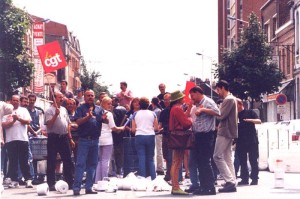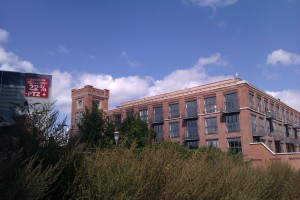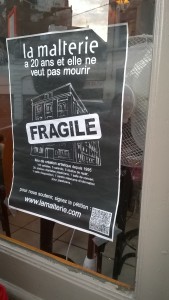Harry Stopes (doctoral candidate, UCL) reflects on his favourite drinking spot in Lille, where he conducted much archival research – and he also reflects on how he became emotionally entangled with the city itself. To what extent do/should historians get emotionally involved in their subjects of study?
—
I was convinced of the appropriateness of comparing Lille and Manchester before I’d ever confirmed the fact in the archives. Their affinity was obvious, to me, in the red bricks, the factories turned into apartments, and the atmosphere in the bars. To cycle through a street of terraced houses in Wazemmes (composed of a dangerous mix of Belgian and English workers, according to a report from 1857[1]) always carried a special interest for this reason.


I came to love Lille through its bars. Most of my favourites are on the Rue des Postes, between the Rue des Pyramides and the Place de la Solidarité, colloquially called the Rond Point du Serpent. There’s Café Jean, Pol’Art, La Boulangerie, Macondo, and a few others. Best of all there’s Le Poste.

The first person who took me to Le Poste, a flatmate called Aline, told me “il resemble à un bar nul.” She was trying to explain the attraction, the sense that Le Poste was great partly because it looked so naff. She was right. There’s a vinyl floor, some worn padded benches, cheap metal tables and chairs, and almost no decoration on the walls. On Wednesday nights they serve Couscous Royal (couscous, mergeuz, chicken stew, mutton and vegetables), but otherwise it’s just a place to drink beer.
Until about a year ago, when the police and the Mairie began a campaign of enforcing licencing hours in Wazemmes and Moulins, the Poste used to host an impromptu lock-in most evenings. If you arrived too late you could usually get in discretely through a side door. Once the shutters went down the atmosphere became more heightened, you could smoke inside, and if it was busy, which it usually was, you’d end up sharing a table with strangers. One Wednesday night I went out alone for couscous and a quiet read of La Voix du Nord, and ended up staying past 3am and singing Jacques Brel with the guy sitting next to me. (I didn’t make it to the archives the next day.)[2]

The reason I bring all this up is to raise, without necessarily having any specific answers, a question about the role of sentiment in our fashioning of ourselves as historians. To what extent do our personal biographies explain the choices we make and the problems we examine in our work? This was a recurring question in discussions at the recent New Directions in French History conference, hosted by the French History Network at the IHR last week. Often we treat this as a matter of politics. Where do our sympathies lie and are we upfront about them? I have sympathies in late nineteenth century Lille and Manchester (and a Nick Hornby-esque list of my top five municipal councillors) but my love for the two cities is not political, I think. That’s not to say that I don’t have politics or that my work doesn’t have political implications, but that when it comes to my work it’s as much a question of (personal) history and temperament.
If you boil it down and strip away the very clear and intellectually defensible reasons for writing about the cultural history of large industrial cities at the end of the nineteenth century, I started working on Manchester because it’s my hometown, because I wanted to make sense of it, and if I’m truly honest because I sought some propitiatory gesture to atone for leaving it. I chose to also write about Lille to keep me from getting too tied up in the specific, to remind me that the work isn’t ultimately about Manchester it’s about the nineteenth century provincial city. Lille helps me to get some critical distance on Manchester: I never planned to take it on as a second home, but it seems I have. Is this a problem? In a way it’s too late to ask. It’s a fait accompli. As Jill Lepore says, I’m “discuss[ing] the rights and wrongs of burglarly while jimmying locks.”[3]
—
[1] Jill Lepore. ‘Historians Who Love too Much’, The Journal of American History, Vol 88, No.1, (June 2001), pp129-144.
[2] In reality, of course, all is not entirely well. The bar life of Wazemmes has been described by the local left wing newspaper La Brique, as “gentrification festive,” takeover by party.
[3] Maire de Lille, Projet d’agrandissement de la ville de Lille. Guermonprez, Lille, 1857. Bibliotheque Municipal de Lille, 29275.



One Response